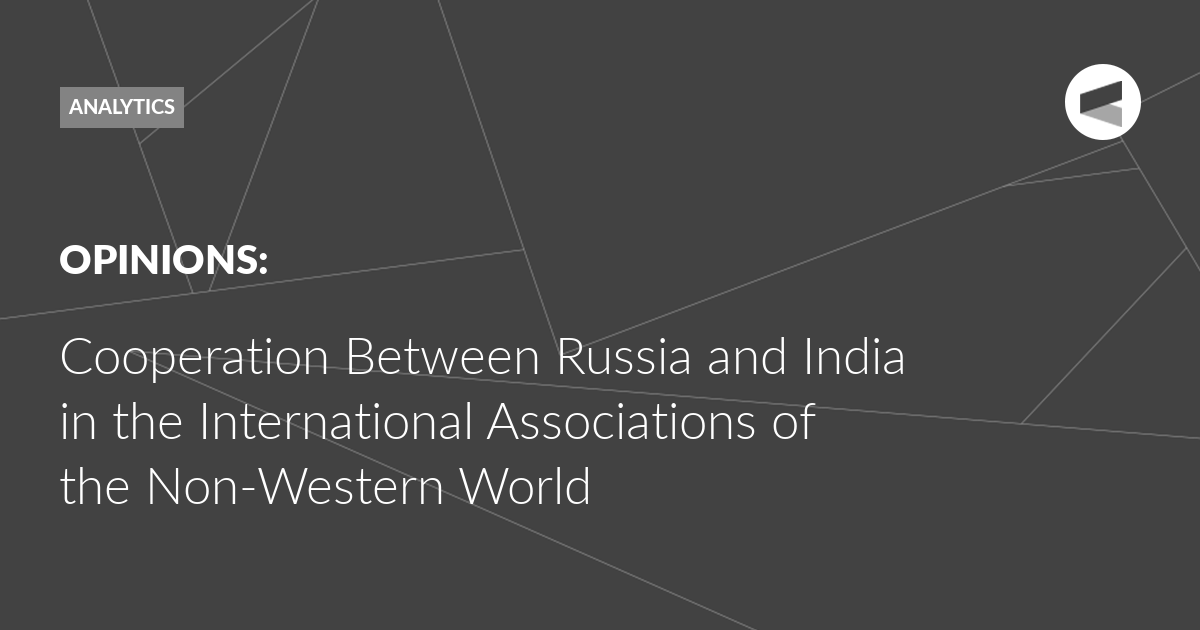Russia and India have a long history of fruitful, mutually beneficial cooperation. Its foundations were laid back in the Soviet period. At the time, both economic ties and trusting political dialogue between our countries were actively developing. In many ways, this Soviet legacy formed a solid foundation for the development of cooperation during the subsequent period. Russia’s relations with India, by and large, were not interrupted even in the difficult 1990s, unlike Moscow’s partnerships with African countries. Therefore, we can talk about direct continuity between the Soviet and post-Soviet stages of cooperation.
Currently, the parties are implementing a number of large joint projects in the economic sphere. Bilateral political summits at the highest level are held regularly. They are supplemented and accompanied by a full-fledged political dialogue at lower levels. Expert cooperation between Russia and India is also actively developing. The Valdai Discussion Club considers partnerships with Indian colleagues to be among its most important priorities. These manifest in the Club’s regular Russian-Indian conferences. Recently, the Valdai Club held another one of them, in cooperation with the Vivekananda International Foundation.
An important circumstance contributing to the development of bilateral cooperation is the interest of Russian society in India. Indian culture and the centuries-old traditions of Indian civilization attract many Russians. The number of schools and clubs studying and practicing various aspects of the Indian tradition is quite large in many Russian cities. Their number and scope of participants significantly exceeds similar civil associations devoted to the study of the culture of other countries and regions of the world. Another important factor is the absolutely positive attitude towards India among the general public in Russia. It is practically free of latent fears, mistrust or jealousy, which are sometimes present in the perceptions Russians hold of a number of other large non-Western states. All this helps create a solid civil base in Russia for further deepening cooperation.
It should also be noted, that India has essentially become one of the leading beneficiaries of the changed geopolitical situation in the world since 2022. The volume of bilateral trade between Russia and India has increased several-fold. Currently, the trade turnover exceeds $60 billion. To a large extent, this was achieved due to a significant increase in the supply of Russian hydrocarbons.
One of the aspects of political cooperation between Russia and India is their interaction in international structures that unite the countries of the Global Non-West and the Global South. Both Russia and India are among the founders of BRICS and remain active members. In 2017, India joined the Shanghai Cooperation Organisation (SCO). It had previously focused on interaction between Russia, China and the countries of Central Asia, and New Delhi’s membership helped give it a broader, essentially pan-Eurasian dimension.
International associations that include states of the Global Non-West and the South have been actively developing in recent years. Quite indicatively, many countries have expressed an interest in taking part in their activities. Moreover, the peak of this interest came after the geopolitical changes in the world in 2022. This essentially means that amid the current split in the world order, many states of the Global South have turned out to be much more interested in having effective non-Western platforms for political dialogue than they had been before. As a result, the BRICS expansion process was launched in 2023, and in 2024 it was supplemented by the formation of a circle of BRICS partner states. The SCO also accepted new member countries in 2022-24.
Amid the expansion of the membership of both structures, both the SCO and especially BRICS, in our opinion, face the task (in addition to the accommodation of new members in the established procedures and mechanisms) of strengthening their own influence on the global and international agenda, promoting independent narratives and strategies in the global information field, and transforming them into real political action.
In BRICS, as in other international associations with similar procedures, the chairmanship changes annually. The chair country determines both the thematic priorities of activities for the coming year and, to a certain extent, the tone of meetings and decisions. This is reflected, among other things, in the final declarations of the annual BRICS summits. It is clear that all members of the association take part in their editing, but it seems that the primary draft of the declaration is prepared by the chair country. It reflects the views of this state on the global agenda. If we compare the declarations of the BRICS summits, year after year, throughout the entire existence of this association, despite their general similarities, in each of them we can identify sufficient semantic differences and features that are associated with the specific approaches of the chair country.
In our subjective opinion, when analysing these declarations, we find that the texts adopted in recent years under the Indian and Russian chairmanships carry the greatest reformist potential. They contain a more critical attitude towards Western approaches and a proposal for independent non-Western alternatives to resolve global problems.
For example, although the BRICS declaration from 2021, the last year of the Indian chairmanship, was mainly written in a neutral style, it expresses its dissatisfaction with the existing system of global governance and calls for its reform. It became one of the strongest BRICS declarations. It expressed “deep disappointment” at the impasse in the International Monetary Fund’s reform process. The declaration also called for the sweeping reform of the World Health Organisation and supported the demand for open patents and the removal of intellectual property rights on critical medical vaccines and drugs. These statements reflected the Indian approach to this issue, voiced by Prime Minister Narendra Modi. Such statements have not been made in BRICS declarations either before or since.
Also, during India’s chairmanship in 2021, the BRICS Joint Statement on Strengthening and Reforming the Multilateral System was adopted, focusing on its representativeness and inclusiveness. It was said that “the continued relevance of the UN system and its associated architecture would be determined by its ability to adapt to contemporary realities and respond to the evolving and inter-connected challenges of our time.” BRICS had never made such a critical remark about the UN system before.
This declaration also reflected the use of historical and philosophical concepts developed in the Indian cultural tradition in relation to modern politics. This approach was then further developed during India’s G20 presidency in 2023. Its declaration was based on the ancient Indian principle of “Vasudhaiva Kutumbakam” (“The whole world is one family”).
The BRICS declarations adopted during the Russian presidency in 2015 and 2024 also carried similar critical semantics and reformist potential. These three declarations (one Indian and two Russian), in our subjective opinion, stood out quite sharply against the background of the “average” BRICS statements. For example, China, during its presidency of the G20 in 2016, put forward a powerful and ambitious programme for the future development of the world, which was reflected in its declaration. But when China chaired BRICS the following year, in 2017, this programme did not receive its continuity, and the BRICS declaration after the Chinese presidency looked much more modest than the text adopted a year before during China’s presidency of the G20.
Thus, the taste for a historical and philosophical understanding of contemporary politics that is now characteristic of both India and Russia, and their attitude towards the reformist potential of BRICS, can serve as an additional factor for bolstering cooperation between our countries in order to strengthen the effectiveness of both BRICS and other international structures.
The Valdai Discussion Club was established in 2004. It is named after Lake Valdai, which is located close to Veliky Novgorod, where the Club’s first meeting took place.
Please visit the firm link to site






